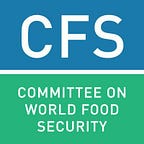CFS 43–43rd Session of the Committee on World Food Security
You gotta fight… for your right… to food
When the Committee on World Food Security (CFS) reformed in 2009 it identified the promotion of the right to food as one of its goals. This was an important development, as recognizing human rights is fundamental to achieving food security.
Despite this development, however, the issue of human rights is still contentious within the CFS. Participants continue to clash over whether to include human rights in the CFS’s outputs and on whether or not to adopt a rights-based perspective in making policy recommendations.
Observers attending the first plenary session of the CFS might have been surprised to see that very few governments chose to mention human rights and the right to food in their opening addresses. Indeed, these were only mentioned a handful of times and only by a few players, such as the Civil Society Mechanism, the Chair and a few countries, including Venezuela, Brazil and Norway.
But what do we mean by the right to food? What are the implications of a rights-based approach to food policy? And why is it so contentious?
What is the right to food?
The right to food is enshrined in the Universal Declaration of Human Rights (art. 25), the International Covenant on Economic, Social and Cultural Rights (art. 11) and a myriad of other international agreements. The Committee on Economic, Social and Cultural Rights identifies the main principles of the right to food in General Comment №12.
The right to food is generally understood as the right to feed oneself with dignity. The United Nations has defined the right to food as being “realized when every man, woman and child, alone or in community with others, has physical and economic access at all times to adequate food or means for its procurement.”
What are the implications for food policy?
The right to food has many implications for food policy.
First, the right to food requires that states that take account of the most marginalized and vulnerable in society when adopting policy.
Second, the right to food places a number of obligations on states. It requires that states:
- Respect the right to food (the obligation not to take measures that harm access to food);
- Protect the right to food (the obligation to take measures to ensure third parties do not harm access to food); and,
- Fulfill the right to food (the obligation to both proactively engage in activities to strengthen access to food and to provide food when an individual or group is unable to access adequate food alone).
These obligations should be adopted into law, but they should also guide and underscore all food policy. Individuals and groups should be able to hold states accountable when they fail to meet these obligations.
Third, the right to food requires that states “take steps to achieve progressively the full realization of the right to adequate food”. States are obliged to take all necessary steps to the maximum of their available resources to ensuring the right to food. Food policies are tools states can use to progressively realize this right.
So why is the right to food contentious?
The right to food is contentious because it requires states to take a number of steps that will fundamentally transform how they currently address food security, and food policy more broadly. States are also concerned they will be held accountable for failing to meet these obligations. For these reasons, states resist including the right to food in the CFS outputs.
Blogpost by Nadia Lambek and Jessica Duncan, #CFS43 Social Reporters — nadia.lambek(at)mail.utoronto.ca/ jessica.duncan(at)wur.nl
Photo: Olivier De Schutter, UN Special Rapporteur on the Right to Food, with villagers (Kampung Terian, Penampank — Indonesia, 2013) Photo courtesy: Nadia Lambek
This post is part of the live coverage during the 43rd Session of the Committee on World Food Security (CFS). This post is written by two of our social reporters, and represents the authors’ views only
Originally published at www.fao.org.
